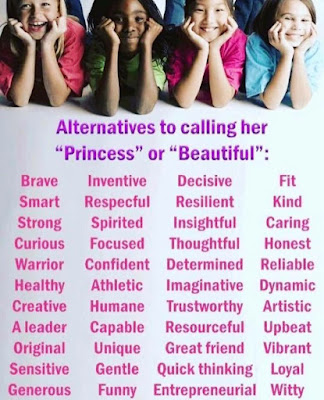How Princess Culture Affects Society
A few days ago, I saw a meme pop up on my Facebook feed listing a bunch of empowering adjectives to use for girls to replace the words "princess" or "beautiful." I admit I might be a little bias as the proud owner of a princess blog, but when I saw this, I couldn't help but think to myself "Those two things are not mutually exclusive!" In recent years, there has been a huge surge of princess-related content in the media that has not only changed what it means to be a princess but has also created an entire culture around it. Just like with all movements, princess culture enthusiasts were quickly met with a large opposition who focus heavily on the negative aspects of what it means to be a princess. As a result, we end up with books like Cinderella Ate My Daughter by Peggy Orenstein, which claim that princesses may prevent girls from living up to their full potential.
Another reason many parents are afraid of princess culture is that they think it is being forced on their children and that it will inevitably make them selfish or submissive. Do you know what is guaranteed to make kids resent their parents more than anything else? It's telling them that they can't be involved with something that they enjoy. Princess culture is not forced on anyone. The only reason it's such a booming industry is that it sells. Girls love it. Taking away something that a child loves will only make them feel repressed and become more submissive later in life, the very quality that princess naysayers are afraid of. If a girl wants to dress up in a satin and lace gown, it's no worse than wanting to wear ripped jeans and old t-shirts and playing in the mud. Being a modern princess means being empowered by your own inner strength and not letting the rest of the world hold you back.
When I was in high school, my parents told me that I was too old to enjoy Disney movies and shows from Cartoon Network. They tried asking different people how they could convince me to stop liking the things I was passionate about and take an interest in things that were considered more suitable to my age group. They eventually came around after realizing that I wasn't going to stop liking things just because they told me to, but at the time, it felt as if my inner princess was being stifled. I felt powerless because the one thing that made me feel inherently like myself was being denied from me. Today, I wear my princess tiara loud and proud and let the world know who I am. That is the power of being a modern princess.
Even though many feminists are anti-princess, a closer look reveals that they are really just two sides of the same coin. Feminists want women to stand tall and claim their right to equal power, and princesses do just that, whether with or without a prince's help. Just because some of us enjoy doing our nails and wearing pretty dresses doesn't mean we're trying to impress anyone but ourselves. If you call a girl a princess, you are just telling her that she has the power to be anything she wants, not that her appearance is the most important thing about her. A modern princess proudly struts her claim to the throne like an invisible crown and lets everyone know that she's in charge when it comes to any issue that has significance to her. Princess culture is not ruining our girls. Taking away a girl's right to find her inner princess and stake her claim to the throne is. Princess culture teaches us that it's okay to be as feminine as you feel so long as you stay true to who you are.













Comments
It’s not a fair representation to say that most feminists are anti-princess. Nor do feminists by and large want women to be or do anything specific. They merely want women, or all people for that matter, to have autonomy and equality to pursue their own best interests, whether that be becoming a princess, a prince, or something else entirely. What they don’t like, for the most part, is the imposition of a set of ideals as to what constitutes a ‘good’ or ‘natural’ femininity. And, these days, feminists are primarily concerned with the eradication of injustice writ large. I think that’s a good thing, princess or not. I am quite sure that you will find that feminists too applaud the contemporary notions of princess that you describe, they just wish the rest of the world had your depth of analysis and understanding. Of course, it’s never correct to paint everyone with the same brush, so someone will prove me wrong at some point, but I think my general points still stand.